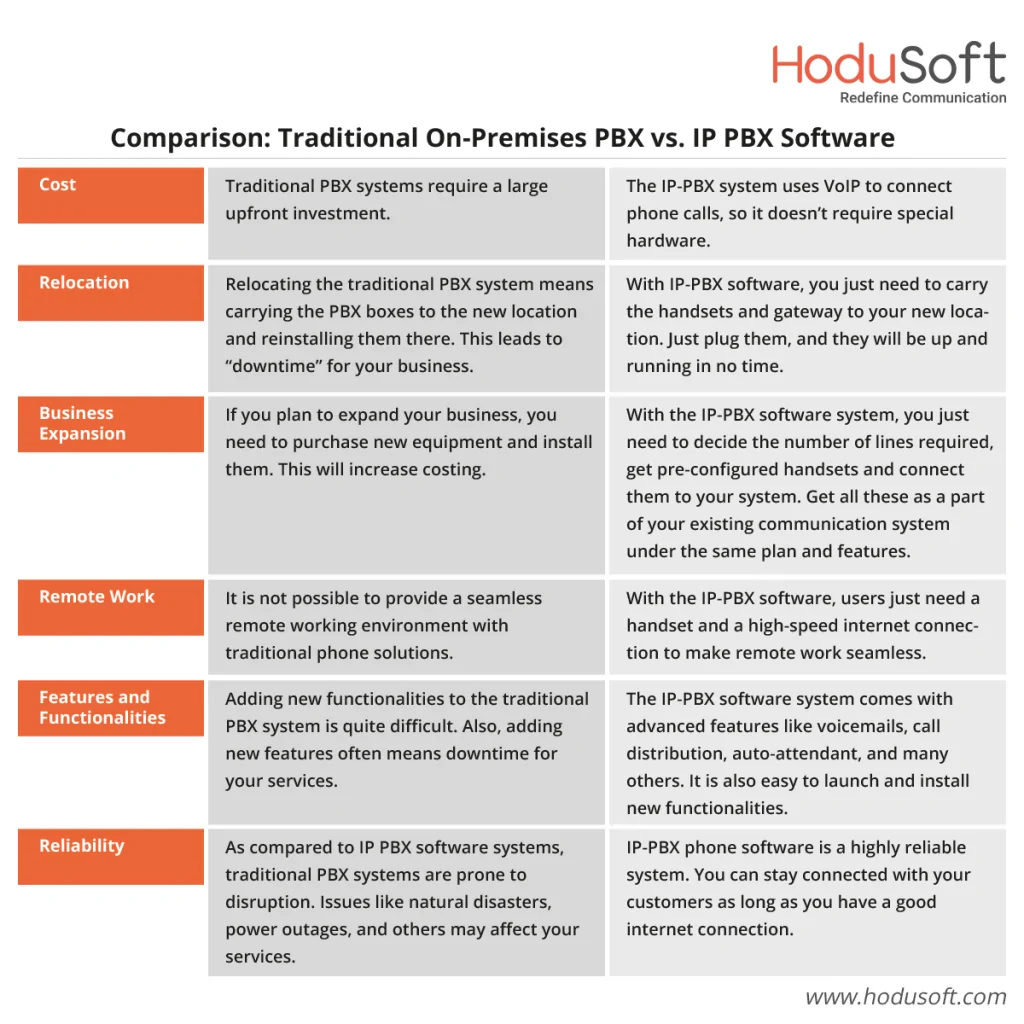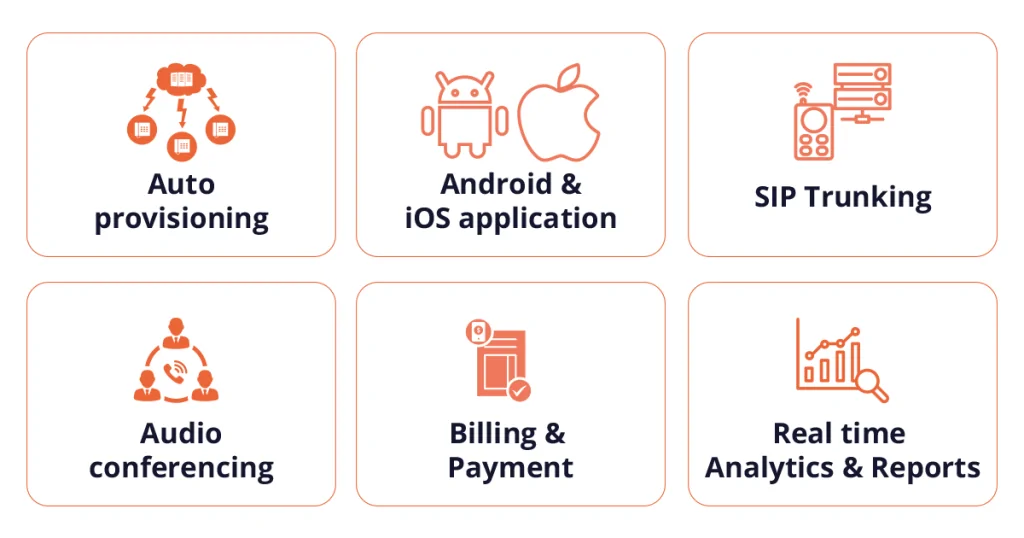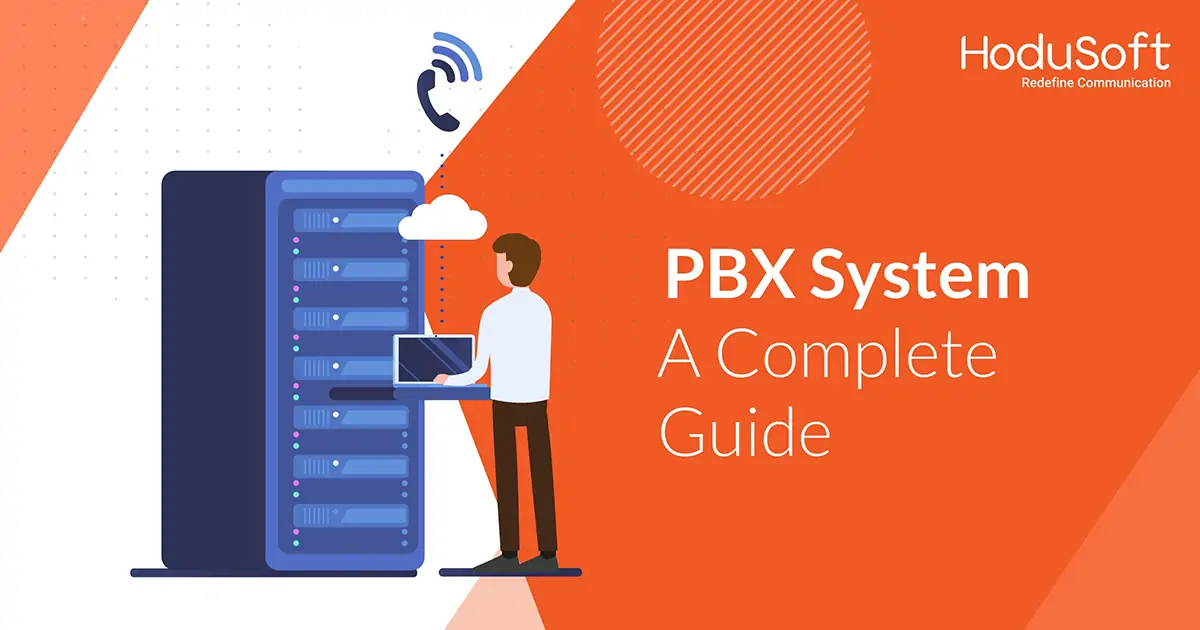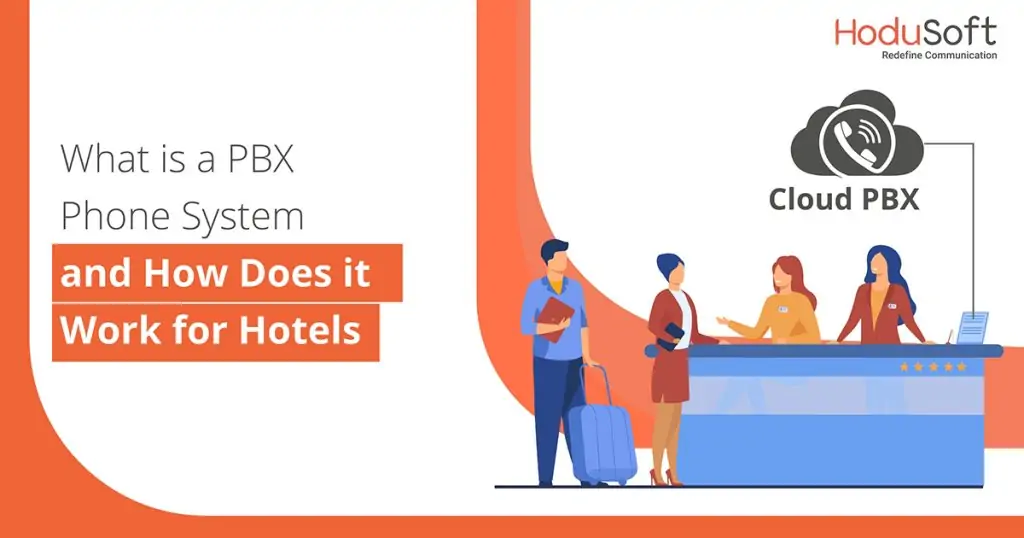A Complete Guide to PBX Phone System
PBX-The modern digital business phone system for today’s businesses
Connectivity, Communication, Collaboration, and Consistency are the key pillars of successful business operations. As you expand your business, you need a business PBX phone system that ensures seamless connectivity and communications across distances and locations. Here, you need to understand the difference and benefits of PBX and IP PBX phone systems.
Here, HoduSoft presents the guide that you’ll ever need to have a better understanding of the PBX phone System.
- What is a PBX?
- How a PBX Phone System Works?
- Benefits of IP PBX Phone System
- Different Types of PBXs
- What is an IP PBX Businesses Phone System?
- The Emergence of IP PBX Software and Cloud Hosted Business Phone Solutions
- Benefits of IP PBX Business Phone System and Hosted Cloud-Based IP PBX Software for Businesses
- Comparison: Traditional On-Premises PBX vs. IP PBX Phone
- The Multi-Tenant Hosted VoIP IP PBX
- Advantages of multi-tenant IP PBX hosted business phone system
What is a PBX?
A PBX is a short form of Private Branch Exchange. It is a private network that lets users communicate with each other. A PBX does more than enable connectivity between personnel located on the same business premises.
A PBX can take care of a company’s complex operations such as routing outbound calls and handling inbound calls. Besides, it also includes features such as voicemail, auto-attendant, and message recording facility in addition to an internal intercom.
In the past decade, IP PBX software has gained a lot of popularity among businesses. It is an excellent option for businesses that deal with a huge volume of calls daily. However, it’s not only large businesses that can benefit from IP PBX, even small enterprises can also enjoy its benefits. If you own a small business and are searching for the best PBX phone system, then you can refer to our guide to finding the best PBX phone system for your small business.
How a PBX Phone System Works?
Initially, before the start of the digital age, businesses used to rely on landline telephone lines (copper-wire lines) to use the analog traditional PBX system. These systems usually consisted of telephony switches to enable phone calls directed to different desk phones within the office.
After the digitalization took place, the PBX system also became modern. Now they work using the internet. Today’s modern business PBX phone system is known as an IP PBX system, digital PBX, VoIP IP PBX, PBX VoIP phone system, and various other names. This business phone system helps in placing and receiving phone calls using digital phone signals. Besides, Ethernet cables are used to provide connections between VoIP phones, which eliminates the need for rewiring.
Want to know more about VoIP phones and their features? Know the top 10 VoIP business phone features that you need in 2022.
Advantages of IP PBX Software in Telecom Industry
Benefits of IP PBX Phone System
Companies whether large or small in several industries are making a switch to IP PBX Software solutions for better communications. The assorted benefits that this PBX VoIP phone system provides have lured industries like the telecom industry, automobile industry, and many others to redefine the way they used to communicate.
Some of the key benefits of the IP PBX phone system include:
- A business PBX phone system reduces the number of phone lines to be run from an exchange to the business.
- Users within the PBX can dial each other and have conversations without having to leave their desks.
- PBX offers various advanced features like auto attendants, call recording, voicemail, etc.
Different Types of PBXs
In the early days, the PBX was entirely managed manually. A dedicated operator taking care of plugging to connect inbound calls to a particular extension, or to connect an extension to an outside line. This gave way to Private Automatic Branch Exchange (PABX), eliminating the need for an operator, while automating all functions. Both are analog, relying on traditional PSTN lines.
The rise of the Internet and Voice over Internet Protocol (VoIP) gave way to the IP PBX System. Initially, these relied on IP Phones, hardware routers, and exchanges. Currently, business IP PBX-based phone systems make use of IP PBX software and “softphones”. These can be used on PCs, mobiles, and cloud technologies. Yet another development is the emergence of hosted IP PBX software. It comes with several advantages like IVR, audio-video conferencing, anytime anywhere use, cost reductions, and more.
It would be correct to say that Analog PBX is on its way out. Hosted IP PBX software based business phone systems are the de-facto choice of both small and large businesses.
Let’s take a look at different types of PBXs
1. On-Premise IP PBX
As the name suggests, the on-premise PBX system is installed in the business premises itself. Besides, it requires a dedicated telephone wiring that is solely maintained by an experienced PBX technician. The system connects to the telephone lines using Public Switched Telephone Network (PSTN) and Integrated Services Digital Network (ISDN) technologies. It is an ideal choice for businesses that have no expansion plans. Some of the key benefits of on-premise PBX include:
- Cost-saving because of server ownership
- Ability to continue using the existing telephone carrier
- Full control over the system
2. Hosted IP PBX
Hosted IP PBX phone is a type of virtual PBX where the service is provided using existing broadband. It uses the internet connection to make and receive calls. With this system, users need not to install any physical machine in their premises. Instead, they need to use any third-party software or hardware to manage their business communication.
The system does not require any telephone lines. The entire communication takes place using SIP trunks technology. You just need some pre-configured IP phones. Just plug-and-play and you are good to go. Some of the key benefits of this modern hosted IP PBX phone include:
- Freedom to connect anywhere across the world
- Ability to host services on any server (inbuilt or third party)
- Cost-effective solution
- Cloud-support
- Ability to adjust PBX features like call routing, call recording, call forwarding, auto attendants, etc.
3. Cloud IP PBX
Over a while, the PBX phone has evolved into a cloud or SaaS system. With the cloud PBX system, users have full control over all their PBX activities. This virtual PBX allows businesses to connect their devices to a cloud-based phone system, thereby helping overcome space and cost constraints. Users can add an array of customizations and integrate their system with various essential services using an API. They can easily control and manage the entire call flow using a virtual interface on their personal computer. Some of the key benefits of a cloud PBX system include:
- No need to rely on any third-party services
- No risk of data loss or technical disturbances
- All the upgradation activities take place over the internet
Choosing the right type of system depends completely on your key requirements. Choose a IP PBX phone software that works best for your business.
Why You Should Switch Your Phone System to IP PBX Software
What is an IP PBX Businesses Phone System?
An IP PBX phone system is a digital system that relies on the internet to transmit voice data signals over IP. The IP telephone makes use of switched packet technology for inbound and outbound calls. A typical IP PBX business telephone system may be hosted on the:
- Site with an IP PBX server,
- VoIP gateway at the core to which you plug in the internet line,
- Traditional PSTN line, and
- A number of IP Phones
The VoIP IP PBX connects to the PSTN using Primary Rate Interface or SIP trunking. This connection helps to establish voice call transfers between IP Phones using the internet. The same system connects users to other PSTN users as well as other IP phone users.
The Emergence of IP PBX Software and Cloud Hosted Business Phone Solutions
If we talk about hardware-based IP PBX business phone systems, there are several limitations associated with these systems. Some of the common issues are:
- Scalability issue
- Compatibility issues with newer protocols and media codecs
- Users are tied to one system with built-in obsolescence
- High maintenance costs
Other than these issues, users having hardware-based IP PBX business phone systems are restricted to their location. Any location change would necessitate the physical transfer of assets to the new location.
The limitations of purely hardware-based IP PBX business phones lead to the rise of IP PBX software. The software eliminated the requirement for hardware-based IP PBX. It also included softphones as well as a facility to permit the use of mobiles as well as IP phones. Besides, scalability is no more an issue and the administrator can add any number of users.
1. IP PBX Software
Several business enterprises usually purchase the software and deploy it on their premises on a specialized server. The server connects the software to other computer systems in the building as well as to desk phones and IP phones.
Users can enjoy full control over the system. But must pay for upgrades and maintenance. Users within the system can use desk phones or softphones on the computer. This not only saves desk space but also allows greater control since the IP PBX software has a lot more features than the hardware-based IP PBX phone system.
The drawback here is that users are limited to within those premises where the IP PBX software is deployed. They get limited access from other places and devices.
2. Hosted IP PBX
With the advent of cloud technologies, there is an increase in the rise of VoIP service providers and hosted IP PBX software solutions. Platforms on which IP PBX business phone systems are based also saw vast improvements like the incorporation of the latest VoIP technologies, protocols, and codecs.
With the IP PBX phone system for small businesses, users need not purchase IP PBX software when they opt for hosted IP PBX solutions. Instead, it is a subscription model based on a number of phones/users/calls and other parameters. The VoIP service provider of IP PBX software offers IP PBX as a service. Users need to pay for the software on a “pay as you go” basis. The software provider takes care of maintenance and upgrades.
The core software resides in the cloud. This means users can have anytime, anywhere access from a multiplicity of devices on their computers. These devices can be mobile phones, laptops, IP Phones, and softphones. They just need to login to start using the service. It is no surprise that VoIP hosted PBX software is now mainstream.
Benefits of IP PBX Business Phone System and Hosted Cloud-Based IP PBX Software for Businesses
On-premises PBX systems are gradually dying out since newer IP PBX software and hosted IP PBX business phone systems came into existence.
On-premises PBX systems have many disadvantages like:
- It involves high upfront costs by way of hardware and maintenance
- It is not easy to migrate or scale hardware-based PBX systems and one is tied to a particular supplier
- It is expensive to use and operate
- It is obsolete given that it connects only to PSTN lines
IP PBX Business Phone System Benefits
IP PBX Business phone systems rely on a mix of IP PBX software and hardware and are usually on-premise solutions. The benefits of this system include:
- Since it is an on-premise solution, users have full control over the system.
- With this system, users can mix and match various devices like softphones, mobile, desk phones, PSTN, and IP Phones for business communications.
- There are more features in IP PBX as compared to older PBX systems.
There are a few limitations also such as:
- High upfront investment in software and then ongoing maintenance.
- Usage may also be limited since the system may be confined to the premises.
- Users also need a team to manage the onsite IP PBX setup.
- In case of a location change, the users have to physically transport the existing servers hosting the software to the new premises. Another alternative is to load the software afresh and reconfigure it. In this case, users also need to provide connections to the new PSTN and internet at the new location.
Hosted IP PBX Business Phone System Benefits
Hosted PBX or hosted IP PBX software is offered by a software provider. The software resides on servers in the cloud. Users can use the hosted IP PBX in the office, from their homes, or any part of the world using computers, softphones on the computer, or mobiles. Some of the key benefits of hosted PBX software include:
- Since it is a cloud-based system, services do not come to a halt if a server goes down
- Users subscribe to the service on a Pay as You Go Model. They can scale up or scale down, depending on usage.
- The VoIP hosted PBX software is modular and users can opt for features they need and pay accordingly.
- Users can eliminate the high costs of telephony associated with PSTN lines.
- If the users need to shift their office, their communications will not disrupt since the IP PBX software resides in the cloud.
- Users can save a considerable amount of space that would otherwise have gone towards housing the IP PBX equipment.
- Users do not need to pay a high-cost upfront for the IP PBX software. (It must be kept in mind that while there are no upfront costs by way of payment of fees for the hosted IP PBX software, running costs may be higher. But these are easily paid through earned profits)
- This system is a great boost for businesses since business owners and managers are always accessible to their customers. All the call records go into the associated central CRM from which users can also draw data from customers.
Six Major Differences between Hosted and On-site IP PBX
Comparison: Traditional On-Premises PBX vs. IP PBX Phone
Should you opt for on-premises IP PBX business phone systems or go for hosted IP PBX software?

As detailed above, traditional on-premises solutions are expensive and involve considerable upfront investment as well as maintenance. It may be suitable for large enterprise-grade businesses. For small to medium businesses, VoIP Hosted PBX Software will be the best option. With this system, you do not need to pay anything upfront. You can even use a variety of devices and access your IP PBX anytime and from anywhere. The only glitch here is that running costs may be slightly higher for the subscription model.
The Multi-Tenant Hosted VoIP IP PBX
Talk about hosted IP PBX software would be incomplete without mentioning multi-tenant hosted VoIP IP PBX.
When a user subscribes to hosted IP PBX business phone solutions the provider grants him a license to use it. License is granted based on the number of users and other parameters. The provider bills the client for using the IP PBX software. In fact, it is a single-user license. Rates are fixed, the currency is fixed and billing is done by the provider to the user. All users and usage go into a central CRM under one head.
The multi-tenant IP PBX system is just like the hosted IP PBX software. The differences are:
- The multi-tenant IP PBX software from a provider permits the user to create sub-tenants or sub-users or user groups.
- Each sub-user or sub-user group accounts, billings, call records and CRM are distinct and separate in a multi-tenant IP PBX system.
- The main tenant can bill a sub-tenant with the freedom to fix rates, usage patterns, and other controls like granting permissions to each such sub-user.
- Each sub-tenant or sub-user can maintain a distinct directory, user group, and CRM. Sub-tenants can manage and control all users and sub-user groups. They can create sub-tenants on their terms. They can even grant permission to a sub-tenant of theirs to add sub-tenants in a tree-branch fashion with separate rates, accounting, billing, and permissions for each.
Advantages of multi-tenant IP PBX hosted business phone system
This multi-tenant IP PBX hosted business phone system service model has quite a few advantages.

- For the service provider, it relieves them of the burden of managing hundreds of sub-continents, accounting, maintaining their call records, and databases. They simply bill the main tenant.
- A tenant enjoys several facilities. They can create sub-tenant groups and monetize their hosted IP PBX service, creating their own VoIP service in a geographic location or across the world. Their sub-tenants are responsible for managing the downstream sub-tenants in a pyramid structure.
- It is a win-win situation for all, especially for large business organizations with multiple branches in different locations. They can keep each branch’s usage separate and yet under the same hosted IP PBX solution.
- It is also good for “IP PBX as a service” providers. They can start with very little investment and benefit from roping in hundreds of sub-tenants.
HoduPBX – The One-Stop Solution for Intelligent, Hosted IP PBX Phone Systems
HoduPBX offers scalability, integration, advanced AI integrations, modular components, white labeling, customization, and lots more in its hosted IP PBX solutions. It also offers multi-tenant IP PBX phone system and solutions tailored and set up to suit each user’s requirements. The big names simply cannot match.


